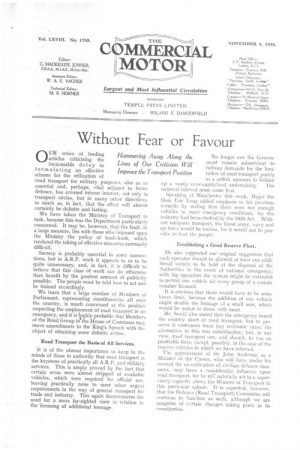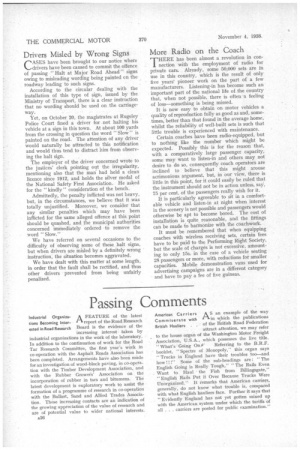Without Fear or Favour
Page 27

Page 28

If you've noticed an error in this article please click here to report it so we can fix it.
Hammering Away Along the Lines of Oar Criticism Will Improve the Transport Position
0 UR series of leading articles criticizing the inexcusable delay in f ormul-ating an effective scheme for the utilization of road transport for military purposes, also as an essential and, perhaps, vital adjunct to home defence, has aroused intense interest, riot only in transport circles, but in many other directions, so much so, in fact, that the effect will almost certainly be definite and lasting.
We have taken the Ministry of Transport to task, because this was the Department particularly concerned. It may be, however, that the fault, in a large measure, lies with those who imposed upon the Ministry the policy of hush-hush, which rendered the taking of effective measures extremely difficult.
Secrecy is probably essential in some connections, but in A.R.P. work it appears to us to be quite unnecessary, and, in fact, it is difficult to believe that this class of work can do otherwise than benefit by the 'greatest amount of publicity possible. The people must be told how to act and be trained accordingly.
We learn that a large number of Members of Parliament, representing Constituencies all over the country, is much concerned at the position respecting the employment of road transport in an emergency, and it is Ilighly probable that Members of the Road Group in the House of Commons may move amendments to the King's Speech with the object of obtaining some definite action.
Road Transport the Basiarof All Services.
It is of the utmost importance to keep in the minds of those in authority that road transport is the keystone of practically all A.R.P. and military services. This is amply proved by the fact that certain areas were almost stripped of available vehicles,. which were required for official use, leaving practically none to meet other urgent requirements in the way of general transport for trade and industry. This again demonstrates the need for a more far-sighted view in relation to the licensing of additional tonnage. No longer can the Government remain subservient to railway demands for the limitation of road transport purely as a selfish measure to bolster
up a vastly over-capitalized undertaking. The national interest must come first.
Speaking at Manchester this week, Major the lion. Eric Long added emphasis to his previous remarks by stating that there were not enough vehicles to meet emergency conditions, for the industry had been choked by the 1933 Act_ Without adequate transport, the finest army, navy and air force would be useless, for it would not be possible to feed the people.
Establishing a Good Reserve Fleet.
He also supported our original suggestion that each operator should be allowed at least one additional vehicle to be held at the disposal of the Authorities in the event of national emergency; with big operators the system might be extended to permit one vehicle for every group of a certain number licensed.
It is obvious that there would have to be some lower limit, because the addition of one vehicle might double the tonnage of a small user, which would he unfair to those with more.
Mr. Sewill also stated that the emergency found the country short of road transport, but to preserve it customers must pay economic rates; the alternative to this was subsidization; but, in our view, road transport can, and should, be run on profitable lines, except, possibly, in the case of the reserve vehicles to which we have referred.
The appointment of Sir John Anderson as a. Minister of the Crown, who will have under his control the co-ordination of civilian defence measures, may have a considerable influence upon road transport, for he will naturally act in a supervisory capacity above the Minister of Transport in this particular sphere. It is expected, however, that the Defence (Road Transport) Committee will continue to function as such, although we are sanguine of certain changes taking place in its constitution.
Drivers Misled by Wrong Signs
CASES have been brought to our notice where .......drivers have been caused to commit the offence of passing "Halt at Major Road Ahead" signs owing to misleading wording being painted on the roadway leading to such signs.
According to the circular dealing with the installation of this type of sign, issued by the Ministry of Transport, there is a clear instruction that no wording should be used on the carriageway.
Yet, on October 20, the magistrates at Rugeley Police Court fined a driver for not halting his vehicle at a sign in this town. At about 100 yards from the crossing in question the word " Slow " is painted on the road. The attention of any driver would naturally be attracted to this notification and would thus tend to distract him from observing the halt sign.
The employer of the driver concerned wrote to the justices' clerk pointing out the irregularity, mentioning also that the man had held a clean licence since 1912, and holds the silver medal of the National Safety First Association. He asked for the " kindly " consideration of the bench.
Admittedly, the penalty inflicted was not heavy, but, in the circumstances, we believe that it was totally unjustified. Moreover, we consider that any similar penalties which may have been inflicted for the same alleged offence at this point should be quashed, and the municipal authorities concerned immediately ordered -to remove the word "Slow."
We have referred on several occasions to the difficulty of observing some of these halt signs, but when drivers are misled by a definitely wrong • instruction, the situation becomes aggravated. We have dealt with this matter at some length, in order that the fault shall be rectified, and thus other drivers prevented from being unfairly penalized.
More Radio on the Coach
THERE has been almost a revolution in connection with the employment of radio for private cars. Already, some 50,000 sets are in use in this country, which is the result of only five years' pioneer work on the part of a few manufacturers. Listening-in has become such an important part of the national life of the country that, when not possible, there is often a feeling of loss—something is being missed.
It is now easy to obtain on motor vehicles a quality of reproduction fully as good as and, sometimes, better than that found in the average home, whilst the reliability of well-built sets is such that little trouble is experienced with maintenance.
Certain coaches have been radio-equipped, but to nothing like the number which might be expected. Possibly this is for the reason that, with a comparatively large passenger capacity, some may want to listen-in and others may not desire to do so, consequently coach operators are inclined to believe that this might arouse acrimonious argument, but, in our view, there is little in this point, for it could easily be ruled that the instrument should not be in action unless, say, 75 oer cent. of the passengers really wish for it.
It is particularly agreeable to sit in a comfortable vehicle and listen-in at night when interest in the scenery is not possible and passengers would otherwise be apt to become bored. The cost of installation is• quite reasonable, and the fittings can be made to harmonize with the coachwork.
It must be remembered that when equipping coaches with wireless receiving sets, certain fees have to be paid to the Performing Right Society, but the scale of charges is not excessive, affiounting to only 1.5s. in the case of a vehicle seating 28 passengers or more, with reductions for smaller capacities. Mobile demonstration vans used for advertising campaigns are in a different category and have to pay a fee of five guineas.




















































































